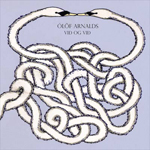|
|
 |
Dusted Reviews
Artist: Ólöf Arnalds Album: Við og Við Label: One Little Indian Review date: Jan. 20, 2010 |

|
|
|
 |
A reasonable initial temptation is to peg Ólöf (not Ólafur) Arnalds as an Icelandic Joanna Newsom: similar kittenish croon, similar off-center instrumentation, similar play between quiet spaces and emotive peaks. A little more time with Vi∂ og Vi∂, though, and she starts to seem equally like an Icelandic Sufjan Stevens: similar use of repetition and deceptive momentum, similar soft-spoken simplicity, similar swan thing going on.
The obvious difference in either case, at least for a likely majority of people reading this, is that her likeably mellow debut—recorded in 2006 and now being released stateside in anticipation of this spring’s Ókídóki—is sung in Icelandic. Not that the folk-troubadour tradition in which Arnalds openly inscribes herself has any linguistic bounds to speak of, but understanding what’s being said nonetheless makes a significant impact. Lyrics are of manifest importance in what Newsom and Stevens do, and for Arnalds they seem even more consequential. Her voice is plenty expressive, but always particularly intent on what it’s expressing.
And unlike even Sigur Rós, who compensate for a language nobody understands with complex, rewarding accompaniment (and whose Kjartan Sveinsson produced Vi∂ og Vi∂ with unflappable cleanness), Arnalds props her songs up on a remarkably slender everything-else. The supporting instruments—charango, ukulele, koto harp—are ornate, but deliberately subdued in the way they interact with her voice, much less her songs. She permits herself a few forays into richer arrangement—subtly on “Klara,” dutifully on “Orfeus og Evridís,” majestically on “Náttsöngur”—but no personal flights of fancy.
That restraint is the legitimately frustrating part, if not the dominant one: in casting the voice as more than an instrument, and the instrument as decidedly less than a voice, Vi∂ og Vi∂ comes across closer to accompanied speech than to song. For a listener who doesn’t speak Icelandic, not even the phonetic musicality of the language manages to make the album feel complete. Whether it coheres better for the listener who does is an inevitable and insidious question, but not one with much ultimate weight. Some of Ókídóki will be in English, and giving it the benefit of the doubt for that reason will be just as unfair as faulting Vi∂ og Vi∂ because it’s not. But just because it’s unfair to write off the latter as 40 fetching minutes with no collective impact doesn’t mean it’s wrong.
By Daniel Levin Becker
|







